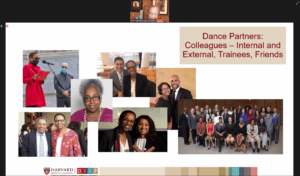UAMS Hosts Inaugural Mentoring Excellence Awards
| Feb. 4, 2022 | The University of Arkansas for Medical Sciences (UAMS) hosted its inaugural Excellence in Mentorship Awards at a virtual Mentor Appreciation Day event Jan. 27.
This was the first year that faculty members across the university were recognized for the commitment, time and knowledge they have given to their mentees throughout the years. Faculty members were selected for six mentoring excellence award categories: Women Faculty, Diversity Faculty Mentoring, Clinical Emerging Faculty, Clinical Legend Faculty, Research Emerging Faculty and Research Legend Faculty Mentoring.
The program was led by Gloria Richard-Davis, M.D., executive director for the Division for Diversity, Equity and Inclusion, and a dedicated team of volunteers from across the campus.
A diverse team reviewed 43 highly competitive applications of nominations and picked one person from each category who embodied excellence in mentoring. Each winner received a plaque engraved with their name and a $1,000 prize funded by the College of Medicine and Graduate School.
UAMS Chancellor Cam Patterson, M.D., MBA, gave opening remarks underscoring the profound impact mentors have on career development.
“I want to congratulate those who are being acknowledged for the work that you have done to make UAMS a better place, and more importantly, for shepherding the next generation who will move health care forward,” he said.
The event featured a keynote address from Joan Y. Reede, M.D., MPH, MBA, who serves as the dean for Diversity and Community Partnership, professor of Medicine at Harvard Medical School and professor of Society, Human Development and Health at Harvard T.H. Chan School of Public Health.
Reede gave a presentation where she compared mentoring to a dance, describing various people who helped her navigate her early years and led her to where she is today.
“For me, there have been multiple individuals who have shown me how to dance,” she said.
She also spoke about roadblocks she has faced professionally and academically due to being a Black woman, noting that the people who helped her throughout the years have emboldened her to advocate for change.
“I’ve had mentors who’ve been white and Black, older and younger,” she said. “Individuals who opened doors and pushed me to think and go beyond what I thought I could do.”
Reede emphasized the importance of finding mentors not only in great leaders but also in peers and colleagues.
“We dance with others in creating the space for change,” she said.
After her presentation, Reede took some questions during a Q&A session. She stressed that while a lot of pressure is put on mentors to give their time and energy, it is also important for mentees to put in the work, too.
The awards were presented by Brian Gittens, Ed.D., vice chancellor for the Division for Diversity, Equity and Inclusion; Susan Smyth, M.D., Ph.D., dean of the College of Medicine; and Robert McGehee, Ph.D., dean of the UAMS Graduate School.
“This evening we celebrate outstanding mentors who selflessly allow others to pick their brains and to lean on their wisdom. These mentors realize there is a time to keep silent and a time to speak, so they bend their ears to listen to what is said and to what is unsaid,” Gittens said.
Smyth quoted Maya Angelou — “In order to be a mentor, and an effective one, you must care.”
“Today, we’re recognizing the care these mentors have displayed across the university,” she said.
McGehee said helping others during his career has been rewarding, whether he simply passed along a piece of information or mentored someone for several years.
“I would like to think that one of the reasons every single member of our faculty is here is because they want to pay it forward and train the next generation,” McGehee said.
Stephanie Gardner, Pharm.D., Ed.D., senior vice chancellor for Academic Affairs and provost, closed out the event, saying mentorship starts with the heart.
“Effective mentors find their greatest satisfaction in giving part of their life to something that really matters: the growth and success of a colleague,” she said.
The six award winners were:
- Women Faculty Mentoring Excellence Award
Melissa Zielinski, Ph.D., assistant professor, Psychiatry
- Diversity Faculty Mentoring Excellence Award
Billy R. Thomas, M.D., professor, Pediatrics, Division of Neonatology
- Clinical Emerging Faculty Mentoring Excellence Award
Joana M. Mack, M.D., assistant professor, Pediatrics, Division of Hematology/Oncology
- Clinical Legend Faculty Mentoring Excellence Award
Larry G. Johnson, M.D., professor, Internal Medicine, Division of Pulmonary and Critical Care Medicine
- Research Emerging Faculty Mentoring Excellence Award
Taren M. Swindle, Ph.D., associate professor, Department of Family and Preventive Medicine, Division of Community Research
- Research Legend Faculty Mentoring Excellence Award
Geoffrey M. Curran, Ph.D., professor, College of Pharmacy
The Division for Diversity, Equity and Inclusion supports a campus wide diversity mentorship platform to connect interested students and residents with faculty members and alumni who will serve as informal mentors. The voluntary program, called Prometheus, has a searchable database of faculty mentors that students and residents can use to identify a great match. Participants can exchange messages, request meetings, and meet via a Zoom-generated invite. To get started, visit the Up Squad website to create a profile. Click “Yes” on the Community Subscription Code option and enter “DDEI2020” in the Community Code field.
Faculty or students interested in serving as a mentor can contact Sharanda Williams, assistant dean for student affairs and diversity; Kim Blann, associate director, Medical Student Admissions and Outreach Programs, or Renisha Ward, DDEI director of Outreach Programs, for more information.
To watch a video of the event and see all the nominees, click here.


